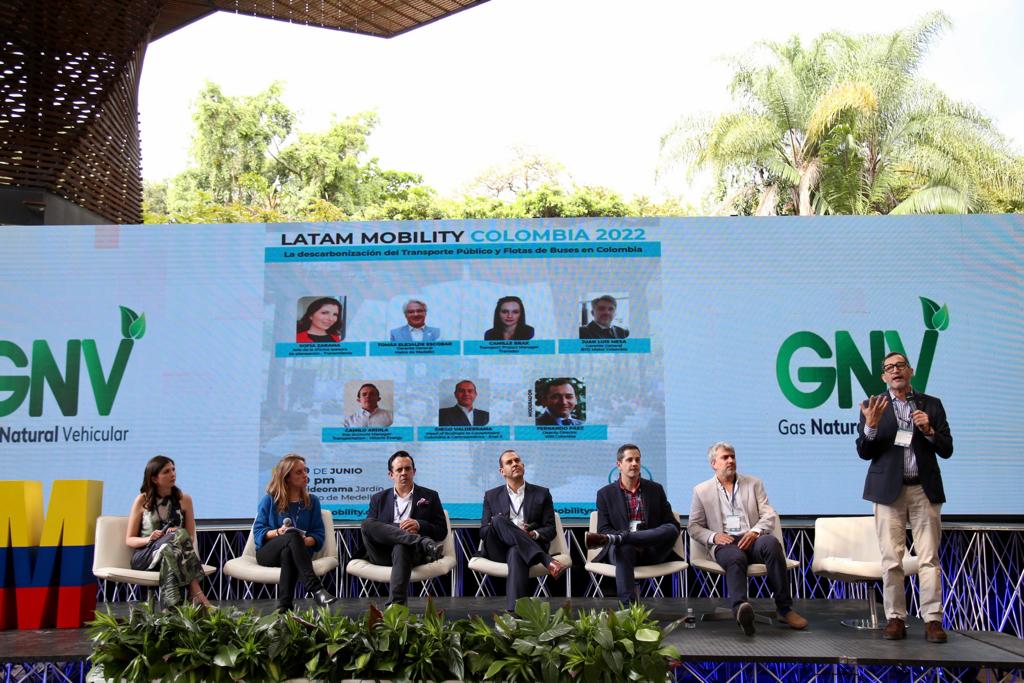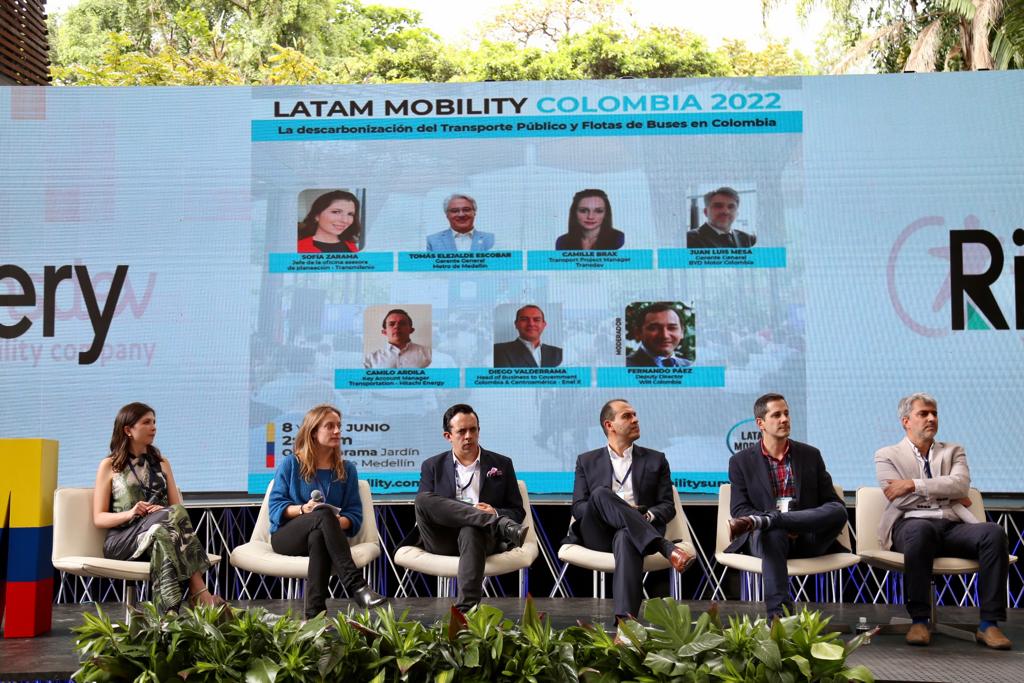
Financing and New Technologies to be Key to Decarbonizing Public Transportation in Colombia

Colombia represents a success story regarding sustainable public transport transition with the inclusion of more than 1,400 electric buses, which represents the largest fleet in the world after China. However, there are still many challenges to conquer in order to achieve an interconnected, sustainable, environmentally friendly system that is a great experience for users.
In this sense, the Latam Mobility Colombia meeting presented the panel “Decarbonization of Public Transport and Bus Fleets” in the country, a discussion that included the participation of representatives of leading public and private companies, who offered their views on the subject.
Sofía Zarama, Head of Transmilenio’s planning advisory office, celebrated the fact that four years after betting on electromobility in Bogotá, they currently have 1062 electric buses in operation, a figure they expect to increase by the end of this year.
She pointed out that despite the achievements, there are still goals to be reached, which is why she considers key to highlight the importance of knowing the technology and structuring business models that allow the financing and infrastructure to respond to the required times.
Zarama emphasized that continuing to train the personnel in charge of maintaining the systems is a crucial aspect on the road to the decarbonization of transportation.
She explained that the planning of complex processes such as public transportation systems requires technical and legal financial analysis, reiterating that maintenance is a fundamental part of the business model.
The official revealed that the integrated public transportation system in Bogota will continue to grow, detailing that the first line of the subway is co-financed and contracted. She also announced that six new mass transportation corridors have already been planned, in order to strengthen the network for users and achieve the vision they have as a city.

For his part, Pedro Buitrago, a representative of Metro de Medellín, highlighted the progress made by a system that has been committed to the decarbonization of transportation since 1995. He noted that the path towards the electrification of the entity began in 2015 and materialized in 2018 when the first electric bus began operating, offering greater performance and facilities for the provision of services.
The public company continued its evolution with the acquisition of 64 electric buses to implement electric mobility in the city, and they are working on expansion plans with the 80 metro, which is already underway, and have other challenges such as evaluating fleet renewal
Private Sector Perspective
Following the experience of public companies such as Metro de Medellín and Transmilenio, representatives of private companies also offered their views at Latam Mobility Colombia on the decarbonization of public transport.
Diego Valderrama, Head of Business to Government Colombia & Central America at Enel X, explained that the group’s global strategy is to accompany all energy transition processes such as electrification and decarbonization.
“We have been present in the entire mobility chain, from cab pilots to the construction of electroterminals, acting as a facilitator for something that is not the future but the present. We want to accompany public administrations and be part of this ecosystem because there is a lot of opportunity to continue implementing electric mobility,” he said.
Enel’s executive considers that in order to consolidate this new technology it is essential to understand the needs of each of the customers and structure the business model to find the solution they specifically require.
“Electromobility is economically viable. There are savings in maintenance, energy and others that go unnoticed. In addition, people can travel without noise, heat or vibrations. These are added values to people’s wellbeing,” Valderrama said.
For his part, Camille Brax, Transport Project Manager of Transdev, emphasized the need to establish financing plans that favor all parties involved, especially so that fleet operators can expand their activities to smaller cities.
“I see an opportunity and interest from the private sector to accompany cities, but we must emphasize aspects such as the compatibility of chargers with buses. We have learned from mistakes and want to help other cities, but we face the challenge of financing,” he said.
For Juan Luis Mesa, General Manager of BYD Motor Colombia, the goal is to always be generating initiatives to improve the way in which citizens are transported, noting that the company is a pioneer with the first fleet of electric cabs in 2012.
He stressed that it is necessary to present a transformative project in public mobility, which demonstrates the remarkable benefits that electromobility brings not only to the environment, but in the field of costs and investment in the medium and long term.
Mesa believes that beyond the current situation, the price of energy will tend to stabilize, compared to the volatility of fossil fuels, which represents another advantage for the transition to sustainable transportation.
Finally, the representative of BYD Colombia called on the national authorities to review the regulations regarding the approval of buses to be adapted to the new times.
Camilo Ardila, Key Account Manager Transportation, Hitachi Energy, closed the panel of Latam Mobility Colombia, highlighting the important contribution of the company in energy and infrastructure, an operation that is governed by the Sustainable Development Goals of the United Nations.
Beyond the uniform and combined process that must be carried out to implement electromobility, the Hitachi representative explained that it is necessary to work on the basis of the characteristics of each city.
“It is necessary to understand the project in a comprehensive manner, but taking into account that each city is very different, in terms of availability of energy access, land for the construction of the yard, and if you want to sacrifice weight and autonomy to move more passengers,” he concluded.





